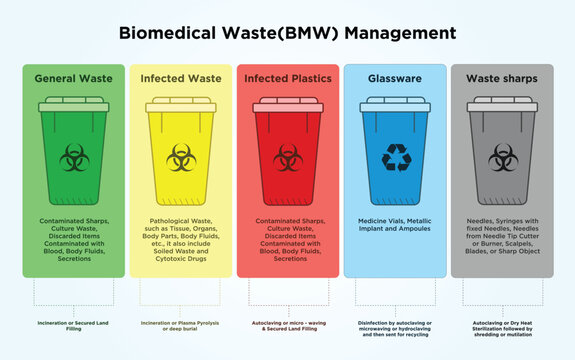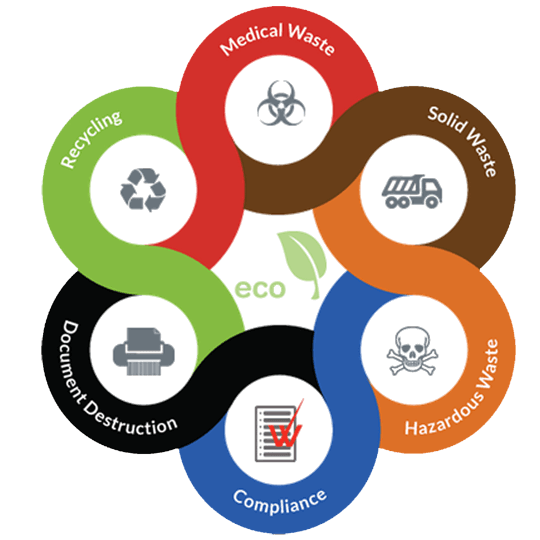Comprehensive Medical Waste Disposal Solutions: Ensuring a Healthy Environment
Making Certain Safe Handling and Disposal of Medical Waste
Guaranteeing safe handling and disposal of clinical waste is of critical importance in health care setups. Inappropriate monitoring of clinical waste can present substantial dangers to the atmosphere, public health, and medical care employees. In this introduction, we will explore the relevance of proper medical waste administration, the risks linked with inappropriate handling and disposal, as well as the guidelines and approaches that can be executed to guarantee its safe disposal.
Significance of Proper Medical Waste Management
Appropriate medical waste administration is of utmost relevance in ensuring the safety and security and wellness of health care specialists, patients, and the general public. Clinical waste describes any type of waste created by healthcare facilities throughout the diagnosis, therapy, or booster shot of animals or humans. This waste can pose significant wellness dangers otherwise taken care of and gotten rid of correctly.
Among the key factors why appropriate clinical waste management is essential is to avoid the spread of transmittable diseases. Clinical waste, such as utilized needles, infected dressings, and organic products, can bring damaging pathogens. If not managed and dealt with correctly, these pathogens can be transferred to healthcare employees, individuals, waste handlers, and even the public, bring about the prospective episode of diseases.
Furthermore, proper clinical waste monitoring assists protect the atmosphere - medical waste removal service. Clinical waste has hazardous products, consisting of chemicals, pharmaceuticals, and contaminated substances. When not managed properly, these compounds can pollute dirt, water bodies, and the air, posing a substantial threat to communities and public health and wellness
Furthermore, effective medical waste administration makes sure conformity with regional policies and international standards. Federal governments and governing bodies have actually established protocols and standards to guarantee the risk-free handling, storage, transportation, and disposal of clinical waste. Sticking to these regulations is essential to stay clear of legal effects and preserve the credibility and credibility of healthcare centers.
Risks of Improper Handling and Disposal

If medical waste is not correctly disposed of,Individuals can additionally be exposed to these contagious diseases. If contaminated needles or various other sharps are not disposed of in assigned puncture-proof containers, they might inadvertently prick people, leading to prospective infections. If medical waste is not set apart properly, there is a threat of cross-contamination between various kinds of waste, further raising the possibilities of disease transmission.
Improper disposal of medical waste can also have destructive effects on the environment and the general public. If clinical waste is not treated and thrown away correctly, it can pollute water resources, dirt, and air, resulting in the spread of pollutants and diseases. This can have long-lasting consequences on ecological communities and public wellness.
Standards for Safe Handling of Medical Waste
Implementing efficient protocols for the safe handling of clinical waste is important in making sure the protection of medical care professionals, people, and the basic public. These guidelines are important in decreasing the dangers connected with the handling and disposal of clinical waste, such as infections, injuries, and environmental pollution.
First and leading, medical care facilities need to develop a comprehensive waste monitoring strategy that abides by local, national, and worldwide regulations. This plan should include clear guidelines on waste partition, packaging, storage, labeling, and transport. It is crucial to separate different sorts of waste, such as sharps, transmittable products, pharmaceuticals, and non-hazardous waste, to prevent cross-contamination and promote secure disposal.
In addition, health care personnel must receive detailed training on correct waste handling techniques. They need to be informed on the potential hazards of clinical waste, the ideal use individual protective devices (PPE), and the appropriate treatments for dealing with, transporting, and getting rid of various kinds of waste.
Additionally, health care centers must on a regular basis check and investigate their waste monitoring practices to guarantee compliance with guidelines. This consists of conducting regular evaluations, assessing waste handling procedures, and offering responses and training to team member.
Effective Techniques for Garbage Disposal
To guarantee the risk-free handling and disposal of clinical waste, it is vital to utilize reliable methods for waste disposal. Medical waste can posture considerable risks to public health and the setting otherwise taken care of and dealt with appropriately. Consequently, medical care centers and waste monitoring companies have to apply suitable strategies to minimize these threats.
One effective method for garbage disposal is segregation. It includes dividing various kinds of clinical waste based upon their qualities. Segregation permits the appropriate treatment and disposal of each waste group, decreasing the possibility for contamination or harm. Medical care centers should supply clear guidelines and training to team member on exactly how to set apart waste correctly.

Furthermore, healthcare facilities must work together with qualified waste administration business to guarantee appropriate disposal of clinical waste. These firms have the experience and devices required to safely handle and dispose of medical waste in conformity with policies and ideal methods.
Training and Education And Learning for Medical Care Professionals
Medical care professionals play an important function in making certain the secure handling and disposal of clinical waste via comprehensive training and education and learning. It find more is necessary for doctor to have a deep understanding of the prospective dangers connected with clinical waste and the correct methods for its management. By receiving proper training, medical care experts can lessen the possible transmission of infectious conditions, prevent ecological contamination, and shield both themselves and the basic public.

In addition, training programs should emphasize using individual safety equipment (PPE) and proper hand health techniques when handling clinical waste. medical waste removal. Health care professionals need to know exactly how to properly get rid of and use of PPE to safeguard themselves from prospective exposure to unsafe products. They need to likewise be informed on the significance of regular handwashing and the correct usage of hand sanitizers to decrease the spread of transmittable illness
Continuing education and learning and normal updates on medical waste administration techniques are essential for medical care specialists. As laws and guidelines evolve, it is necessary to maintain doctor informed regarding any modifications in procedures and finest techniques. This will certainly make certain that they stay updated and maintain a high criterion of security in dealing with and disposing of medical waste.
Verdict
To conclude, correct handling and disposal of clinical waste is important to make certain the safety and security of healthcare professionals, clients, and the environment. Ignoring to adhere to policies and standards can result in numerous risks and threats. Executing reliable strategies for garbage disposal and providing suitable training and education and learning for healthcare experts are important in preserving a risk-free medical care environment. By adhering to these methods, we can minimize the potential threats linked with clinical waste.
Clinical waste refers to any kind of waste created by health care centers throughout the medical diagnosis, therapy, or immunization of animals or human beings. If medical waste is not segregated effectively, there is a risk of cross-contamination between different kinds of waste, more increasing the chances of illness transmission.
It is vital to divide different types of waste, such as sharps, contagious products, drugs, and non-hazardous waste, to prevent cross-contamination and promote safe disposal. WasteX Medical Waste Disposal.
To guarantee the risk-free handling and disposal of clinical waste, it is important to utilize reliable methods for waste disposal. Furthermore, health care facilities need to develop a routine waste collection and transportation routine to prevent waste build-up and decrease the danger of accidents or contamination.